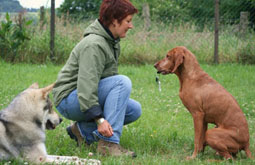Domestic Dog
The domestic dog belongs to the family of the canidae and is a predator. Dogs are direct descendents of wolves originally to be found throughout Europe, Asia, and North America. Selective breeding has led to physical and behavioral changes so that today, domestic dogs differ from wolves in many aspects. Despite these differences and the dog’s adaptation to living with human beings, dogs remain direct descendents of wolves – a fact reflected in particular by their natural requirements. Learn more about dogs here.
A social animal that requires much freedom of movement
Dogs have a pronounced need to move and exercise. Daily walks – on the leash or freely – help dogs to satisfy their natural requirement to discover, play and socialize as well as to structure their day and avoid boredom. A dog’s ideal resting and sleeping place should be clean, dry and protected from drought and heat. A cold concrete floor or a dark cellar are inappropriate. If dogs are held outdoors, they require a spacious double walled doghouse with an insulated floor to protect them from wind and rain. For a pronounced herd animal used to living in packs, regular social contact is vital. In line with its role, the domestic dog therefore requires regular social contact with human beings. In a human-dog relationship, the dog will assume its fixed place within the social hierarchy. This will offer it safety and security. Therefore, it is a form of torture to hold dogs individually in kennels.

